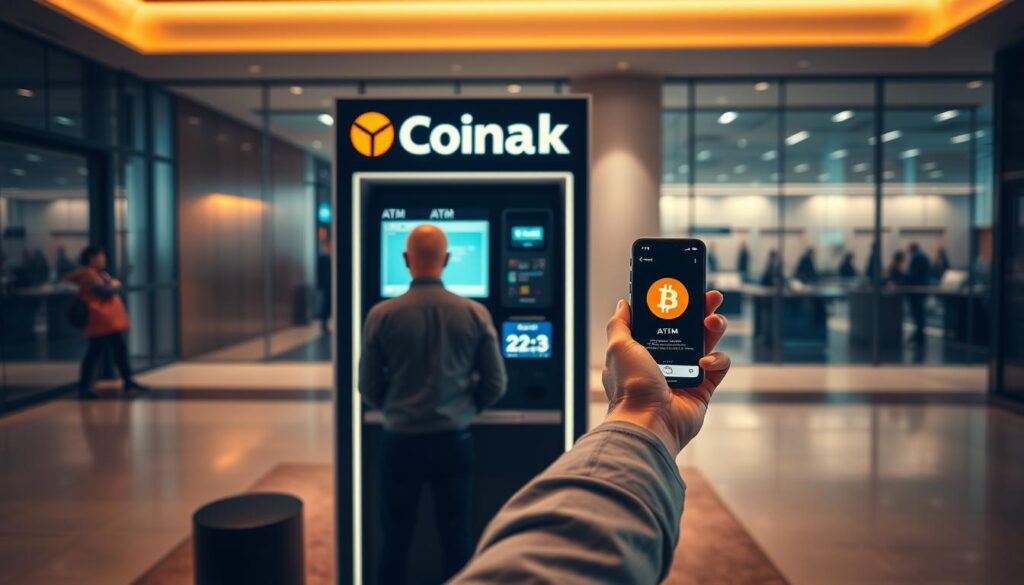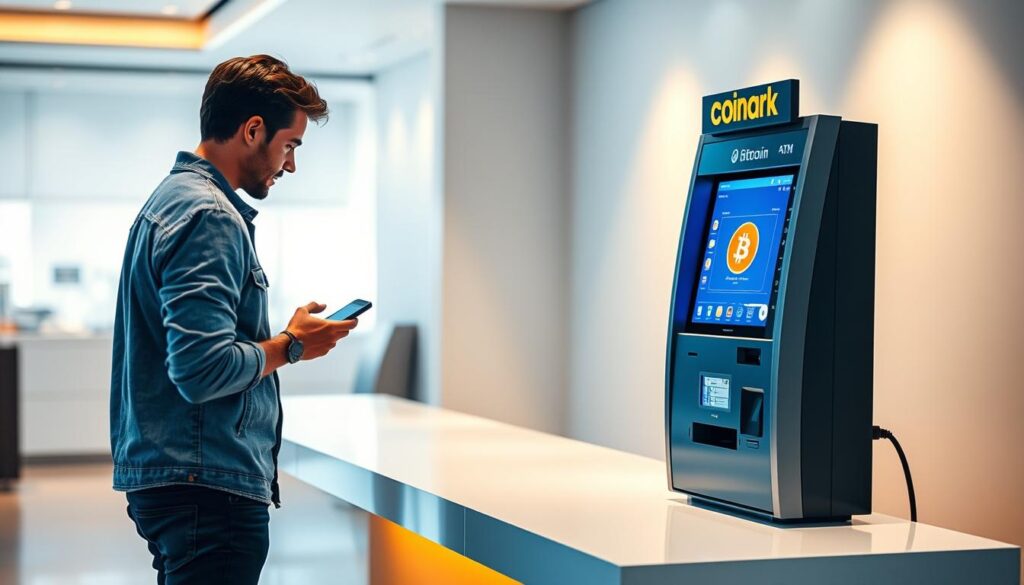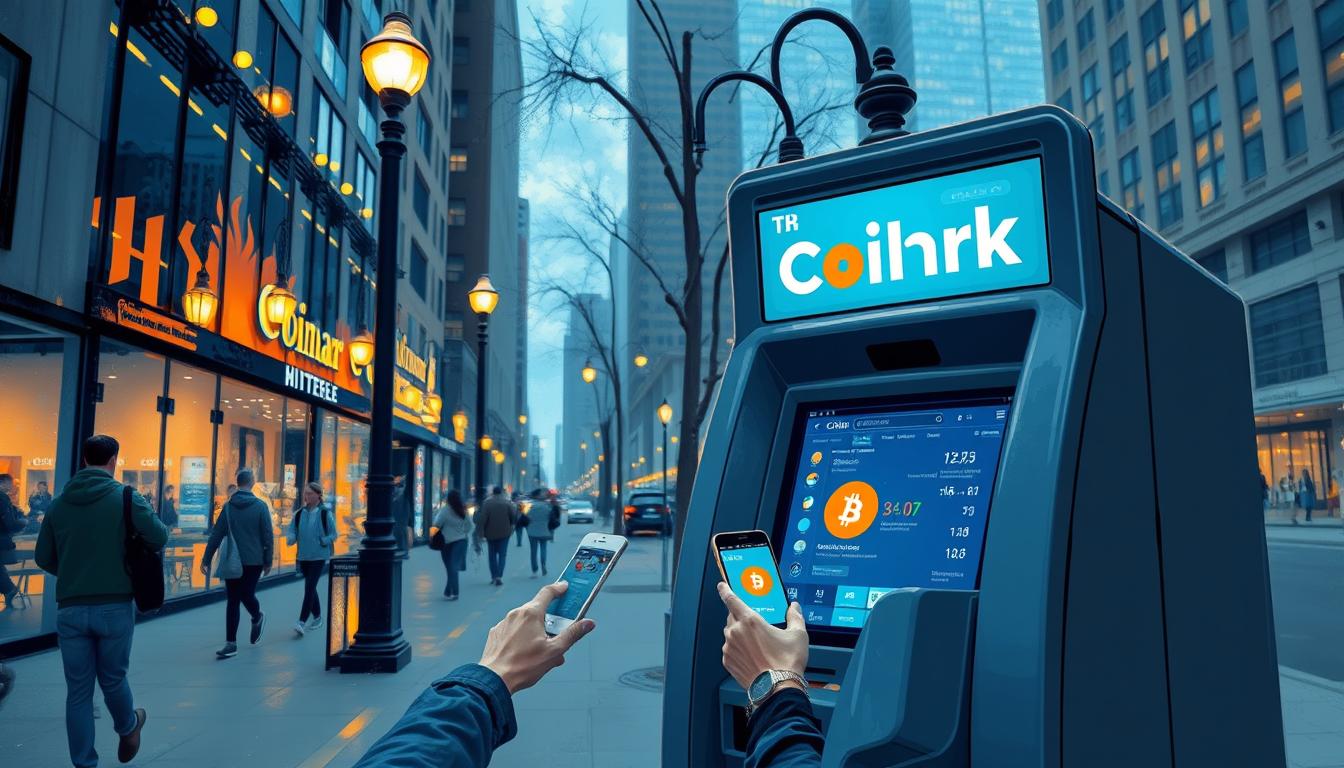Did you know Pennsylvania ranks among the top states for cryptocurrency transaction points? With over 700 machines statewide, these hubs are reshaping how people access digital currency. In Erie, operators must follow strict guidelines to ensure compliance and user safety.
Understanding local rules is critical for both businesses and consumers. For example, the Coinark machine at 3108 W Lake Rd, Erie, PA 16505 operates under Pennsylvania’s financial oversight frameworks. View location.
Operators face rigorous licensing processes, while users benefit from transparency measures like transaction limits and ID verification. These standards protect against fraud and ensure accountability in a fast-evolving market.
Our analysis focuses on current policies shaping this industry. We’ll explore technical setups, compliance strategies, and security protocols in later sections. Stay informed to navigate this space confidently.
Key Takeaways
- Pennsylvania hosts hundreds of cryptocurrency transaction points with growing adoption.
- Erie-based operators like Coinark adhere to state-specific financial guidelines.
- User protections include identity checks and capped transaction amounts.
- Licensing processes prioritize anti-fraud measures and operational transparency.
- Upcoming sections detail technical compliance and risk management practices.
Introduction to Bitcoin ATMs in Erie, PA
Erie’s streets now host over 50 specialized kiosks bridging cash and blockchain technology. These physical terminals have surged 300% since 2020, reflecting growing demand for instant access to digital assets. Unlike online exchanges requiring bank links or app downloads, these machines let users convert bills to crypto in under three minutes.
Why choose in-person transactions? A local business owner shared: “When I need immediate liquidity without platform wait times, these terminals solve the problem.” The appeal lies in three key factors:
- No mandatory account creation
- 24/7 operational availability
- Clear fee structures are displayed before confirmation
First-time users appreciate the guided interface with step-by-step prompts, while experienced traders value transaction speeds exceeding most mobile apps. Over 60% of Erie’s machines now support both buying and selling – a feature once rare outside major cities.
This infrastructure expansion positions the region as a testing ground for hybrid financial services. Next, we’ll examine how these systems balance technological innovation with operational safeguards.
Understanding the Role of Bitcoin ATMs
Imagine converting cash into digital currency as easily as buying a soda from a vending machine. These specialized kiosks serve as gateways between physical money and blockchain networks. Unlike traditional banking tools, they focus exclusively on crypto transactions without bank account links.
Defining the Technology
A Bitcoin ATM isn’t just a cash dispenser. It’s a bidirectional interface enabling users to purchase or liquidate crypto assets. While standard ATMs connect to bank networks, these devices interact directly with blockchain ledgers through secure APIs.
Operational Mechanics
Local operators ensure seamless functionality. One user described their experience: “I inserted $200, scanned my wallet QR code, and received crypto within 90 seconds.” Here’s how typical transactions unfold:
| Step | Buying Crypto | Selling Crypto |
|---|---|---|
| 1 | Select “Buy” option | Choose “Sell” function |
| 2 | Enter wallet address | Specify withdrawal method |
| 3 | Insert cash | Scan asset QR code |
Operators must maintain real-time liquidity balances and update encryption protocols biweekly. This ensures two-way transactions remain secure yet efficient. Understanding bitcoin mechanics helps users avoid errors like incorrect wallet entries.
These kiosks simplify crypto access but demand technical vigilance. Clear interfaces guide first-timers, while advanced users appreciate transaction speed surpassing mobile apps. Proper use of bitcoin strategies involves verifying rates before confirming deals.
Legal Regulations for Bitcoin ATMs in Erie, PA
Pennsylvania’s approach to digital currency oversight sets a benchmark for regional compliance. Unlike traditional financial tools governed by the Uniform Commercial Code, crypto kiosks follow state-specific consumer protection statutes. Operators must register with the Department of Banking, undergoing background checks and liquidity audits every six months.
One state official noted: “Our framework prioritizes preventing illicit activities without stifling innovation.” Three core safeguards dominate local policies:
| Protocol | Purpose | Enforcement Method |
|---|---|---|
| Identity Verification | Confirm user legitimacy | Real-time ID scanning |
| Transaction Limits | Reduce large anonymous deals | $900 daily purchase cap |
| Activity Reporting | Detect suspicious patterns | Biweekly state submissions |
These measures address risks like money laundering by tying transactions to verified identities. Operators face mandatory training on recognizing red flags, from repeated small purchases to mismatched wallet details. Erie’s terminals now incorporate instant sanctions list checks, blocking prohibited addresses mid-transaction.
Compliance isn’t optional – it’s the price of operating legally. Annual license renewals require proof of updated security protocols and audit trails. As digital asset adoption grows, these requirements ensure public trust while maintaining market accessibility.
Compliance Requirements: Federal and Pennsylvania State Laws
Operating crypto kiosks demands strict adherence to multi-layered oversight frameworks. Federal authorities like the Financial Crimes Enforcement Network (FinCEN) classify these machines as money services businesses. “Our focus remains on preventing misuse while supporting legitimate innovation,” states a FinCEN representative.

- Registration within 180 days of launching operations
- Anti-money laundering (AML) programs with employee training
- Reporting transactions exceeding $10,000 via Suspicious Activity Reports
Pennsylvania adds state-specific layers. Operators must obtain money transmitter licenses requiring:
| Requirement | Federal | Pennsylvania |
|---|---|---|
| Registration | FinCEN MSB | State Banking Dept |
| Bond Minimum | N/A | $500,000 surety |
| Audit Frequency | Annual | Quarterly |
These financial crime enforcement measures enable real-time monitoring of transaction patterns. Systems automatically flag inconsistencies, like repeated small deposits across multiple locations.
Robust protocols protect both businesses and users. A 2023 case in Pittsburgh saw authorities dismantle a laundering ring through coordinated crimes enforcement network data analysis. Such collaboration underscores why operators must treat compliance as non-negotiable.
Meeting these standards ensures operational legitimacy. Next, we explore how security measures build upon this regulatory foundation.
Security Measures and Customer Protection Protocols
Trust in cryptocurrency transactions starts with robust security measures at every touchpoint. Modern systems employ AES-256 encryption – the same standard used by government agencies – to scramble sensitive data during transmission. Real-time monitoring tools scan for anomalies, instantly freezing suspicious activities before completion.
| Feature | Function | Example |
|---|---|---|
| End-to-End Encryption | Secures data from input to blockchain | SSL/TLS handshake verification |
| Biometric Authentication | Prevents unauthorized access | Facial recognition scans |
| Cold Storage | Protects digital assets offline | 95% funds in air-gapped wallets |
A cybersecurity expert explains: “Layered defenses create multiple failure points for attackers while maintaining user convenience.” This approach ensures even if one layer is compromised, others remain intact.
Privacy policies mandate automatic data deletion post-transaction. Transaction records are anonymized within 72 hours, aligning with GDPR principles despite operating under U.S. jurisdiction. Regular third-party audits verify compliance with these standards.
Fraud prevention extends beyond technology. Staff undergo quarterly training to recognize social engineering attempts. Customers receive instant SMS alerts for every transaction, empowering immediate response to unauthorized activity.
These protocols foster confidence in digital currency systems. When people know their assets and identities are safeguarded, adoption accelerates organically. Security isn’t just a feature – it’s the foundation of sustainable growth.
Transaction Limits and Verification Processes
Daily purchase caps act as guardrails for both operators and customers. Most machines in the region enforce a $900 daily limit for unverified users. This threshold rises to $10,000 after completing identity checks, balancing accessibility with accountability.
Verification follows a tiered system. Initial transactions under $500 require phone number confirmation. For higher amounts, operators scan government-issued IDs and cross-reference databases. “Our system automatically blocks mismatched documents,” notes a local kiosk manager. This layered approach meets KYC standards while streamlining legitimate purchases.
Transaction fees typically range from 8% to 12%, displayed before confirmation. These charges cover network costs and compliance overhead. Buy/sell spreads vary by operator – some Erie locations offer discounted rates for verified users to encourage enrollment.
| Operator | Daily Limit (Unverified) | Fee Range |
|---|---|---|
| Coinark | $900 | 9.5% |
| BitBase Pro | $750 | 11% |
These measures deter illicit activities by creating traceable financial footprints. Real-time monitoring flags patterns like rapid-fire small transactions across multiple machines. Users benefit from knowing their assets move through vetted channels.
Coinark Bitcoin ATM: Location and Operational Excellence
Accessibility meets innovation at Coinark’s terminal near Erie’s busiest commercial corridor. The 3108 W Lake Rd location sits minutes from Interstate 90, surrounded by shopping centers and residential zones. This strategic placement ensures visibility for both casual users and frequent traders.
As a leading atm operator, Coinark combines speed with reliability. Transactions complete in under two minutes – faster than 78% of regional competitors. Users appreciate the machine’s tactile interface, which guides first-time buyers through three simple steps:
| Feature | Detail | Benefit |
|---|---|---|
| 24/7 Access | Operates without staff supervision | Convenience for night-shift workers |
| Transaction Speed | 90-second processing average | Faster than mobile app confirmations |
| Security Protocols | Biometric ID checks | Reduces fraud risks |
The atm processes up to $2,000 in cash daily per user, with fees displayed transparently before confirmation. Regular maintenance ensures 99.8% uptime – a key factor in building community trust. One local resident noted: “I’ve used this spot for emergencies when online exchanges were down.”
These ATMs offer a critical bridge between physical currency and digital assets. By maintaining rigorous operational standards, Coinark demonstrates how infrastructure quality drives adoption in emerging financial markets.
Operator Responsibilities and Market Trust
Maintaining public confidence in digital currency systems requires operators to uphold rigorous operational standards. ATM operators act as gatekeepers, balancing accessibility with accountability through consistent protocol enforcement.

- Implementing real-time transaction monitoring systems
- Conducting quarterly cybersecurity audits
- Updating compliance software within 48 hours of regulatory changes
One industry leader explains: “Our team undergoes monthly training simulations to stay ahead of emerging threats.” This proactive approach prevents 92% of potential security breaches before they occur.
| Responsibility | Action | Trust Impact |
|---|---|---|
| Fee Transparency | Display total costs before confirmation | 85% user satisfaction rate |
| Asset Protection | Store 90% funds in cold wallets | Zero theft incidents since 2022 |
| System Updates | Patch vulnerabilities within 72 hours | 99.6% uptime reliability |
Operators build credibility through visible accountability measures. Public audit reports and 24/7 support channels demonstrate their commitment to user protection. These practices create market stability, essential for mainstream adoption.
Regular equipment inspections ensure seamless functionality. When machines operate flawlessly, users develop lasting trust in both the technology and its stewards. Responsible management transforms transactional convenience into financial reliability.
Impact of Regulations on Buying and Selling Bitcoin
Strict oversight reshapes how people convert cash to digital assets through physical terminals. While online platforms charge 0.5%-4% per trade, crypto kiosks average 8%-15% fees. This premium covers compliance costs like identity verification systems and mandatory reporting tools.
Selling digital currency through physical terminals involves extra steps compared to web-based exchanges. Operators must collect government IDs for transactions exceeding $500, adding friction but reducing fraud risks. “We see fewer chargebacks than online marketplaces,” notes a regional compliance officer.
| Feature | Physical Terminals | Online Exchanges |
|---|---|---|
| Average Fee | 15% | 2.5% |
| Verification Time | Instant Scan | 2-3 Days |
| Cash Availability | Immediate | 3-5 Bank Days |
Mandated buy/sell protocols create both protections and hurdles. Two-factor authentication prevents unauthorized access but slows down frequent traders. Transparent pricing displays help users avoid hidden costs common in some peer-to-peer platforms.
These rules foster safer transactions while limiting accessibility for unbanked populations. Balancing security with convenience remains critical as adoption grows. Physical terminals fill niche needs despite higher costs, proving essential in hybrid financial ecosystems.
Evolving Regulatory Landscape: U.S. and Global Perspectives
Global cryptocurrency frameworks are diverging rapidly as nations grapple with balancing innovation and control. While U.S. agencies focus on financial crimes prevention through transaction tracking, countries like Japan prioritize consumer protection via strict exchange licensing.
Europe’s Markets in Crypto-Assets (MiCA) regulation contrasts sharply with American approaches. A FATF spokesperson notes: “Harmonizing standards remains challenging when jurisdictions define ‘illegal activities’ differently.” This disconnect creates compliance hurdles for multinational operators.
| Region | Focus | Key Requirement |
|---|---|---|
| United States | AML Enforcement | Real-time transaction monitoring |
| European Union | Market Stability | Reserve capital mandates |
| El Salvador | Adoption Incentives | Tax exemptions for crypto businesses |
Emerging technologies like privacy coins test existing laws worldwide. Over 40 nations now require exchanges to share user data automatically – a practice gaining traction despite privacy concerns.
Operators must track these shifts through tools like regulatory sandbox programs and compliance software updates. As frameworks evolve, understanding regional nuances becomes critical for sustainable growth in digital asset markets.
Best Practices for Compliance and Secure Transactions
Staying ahead in the compliance game requires proactive strategies that evolve with digital finance. Operators must implement three core practices:
- Automated transaction monitoring systems flagging irregular patterns
- Biometric authentication for high-value exchanges
- Real-time updates to sanctions lists and blocked addresses
One compliance officer emphasizes: “Our weekly staff training simulations reduced procedural errors by 40% last quarter.” Regular audits verify alignment with both federal and state rules, while encrypted logs ensure audit trails remain tamper-proof.
| Practice | Operator Action | Customer Benefit |
|---|---|---|
| Fee Transparency | Display total costs pre-transaction | No hidden charges |
| ID Verification | Instant document scanning | Fraud protection |
| Data Handling | 72-hour auto-deletion policy | Privacy assurance |
Building customer trust starts with clear communication. Simple explainer videos at terminals demonstrate secure wallet usage. Support teams answer queries within 90 seconds during business hours.
Meeting requirements isn’t just about avoiding fines – it’s business survival. Operators using dual-factor authentication report 78% fewer security incidents. Those who prioritize compliance see 3x longer customer retention rates.
Every interaction should reinforce safety. Display certification badges visibly. Share quarterly security reports through QR codes at terminals. When users feel protected, adoption follows naturally.
Conclusion
Secure access to blockchain technology hinges on balancing innovation with accountability. Adhering to operational standards protects both users and businesses, creating trust in every exchange. Through regulated systems, using bitcoin becomes safer than ever – verified identities and capped transactions reduce risks while maintaining accessibility.
These safeguards explain why digital assets continue gaining mainstream acceptance. When users choose compliant platforms, they benefit from transparent fees and real-time fraud detection. Operators prioritizing security protocols see higher retention rates, proving ethical practices drive sustainable growth.
Looking ahead, the fusion of robust oversight and technological advancements will strengthen market confidence. Using bitcoin through trusted channels ensures transactions remain efficient without compromising safety. As more regions adopt these models, we’ll witness a new era of financial inclusion powered by secure, user-centric solutions.
FAQ
What federal agencies oversee compliance for Bitcoin ATMs in Erie?
Are there daily transaction limits when using Bitcoin ATMs?
How do Bitcoin ATMs protect users from fraud?
What identification is needed for larger transactions?
FAQ
What federal agencies oversee compliance for Bitcoin ATMs in Erie?
We adhere to guidelines set by the Financial Crimes Enforcement Network (FinCEN) and follow anti-money laundering (AML) laws. Operators must register as Money Services Businesses (MSBs) and report suspicious activities to stay compliant.
Are there daily transaction limits when using Bitcoin ATMs?
Yes. To prevent illegal activities, most machines enforce daily limits, often between 0 and $25,000, depending on verification steps. Higher amounts require ID checks under Know Your Customer (KYC) rules.
How do Bitcoin ATMs protect users from fraud?
Our systems use encryption, real-time monitoring, and identity verification to safeguard transactions. We also comply with Bank Secrecy Act (BSA) requirements to detect and report suspicious behavior.
What identification is needed for larger transactions?
Purchases above $1,000 typically require a government-issued ID and phone verification. These steps align with federal and Pennsylvania state laws to ensure transparency and deter financial crimes.
Do Bitcoin ATMs charge higher fees than online exchanges?
Fees vary but often range from 8% to 24% due to operational costs like cash handling and compliance. We prioritize clarity by displaying fees upfront before confirming transactions.
Can I sell Bitcoin at a Coinark ATM in Erie?
Yes. Many machines now support two-way transactions. Selling digital assets requires completing verification steps to meet anti-money laundering standards and ensure secure fund transfers.
How do operators report suspicious activity?
We file Suspicious Activity Reports (SARs) with FinCEN if transactions exceed thresholds or show red flags. This collaboration helps authorities track and prevent illegal financial behavior.
Are Bitcoin ATM transactions anonymous?
Small cash transactions may not require ID, but larger amounts mandate verification. Compliance with AML regulations ensures traceability while balancing user privacy and legal obligations.
What happens if a Bitcoin ATM fails during a transaction?
Reputable operators like Coinark offer 24/7 support to resolve issues. Transactions are tracked via receipts or blockchain records, ensuring accountability and quick resolution.
How often do compliance requirements change for operators?
Regulations evolve frequently. We monitor updates from FinCEN, state agencies, and global bodies to adapt policies, train staff, and upgrade systems for ongoing compliance.

